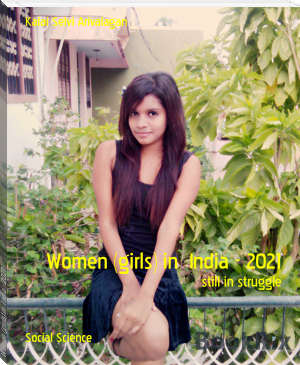India Beyond Stampede Of Stupidities - Santosh Jha (notion reading list .txt) 📗

- Author: Santosh Jha
Book online «India Beyond Stampede Of Stupidities - Santosh Jha (notion reading list .txt) 📗». Author Santosh Jha
There is a famous story, which speaks of how people have an innate consciousness to justify wrongs, if it suits them. A person said that he would not make his son honest, till everyone else in the world becomes so. The procrastination of small and part virtues, till that situation of universal and perfect idealism, is a smart license of all wrongs, which people always do and this attitude often gets a huge support from political system as it benefits from the populism.
The issue of corruption is similar. If everyone says, he or she shall not stop corruption till others do it, the problem can never end. What politics does is become a party to this attitude of corruption and become soft on the issue. This populism suits everyone and that is why, it never ends. Corruption in India and also everywhere else, is not diminishing and probably can never, because, it suits everyone.
The simple reality is, the populist idea, which presents a highly generalized and romantically shaded picture that common man is a victim and all political parties and politicians are villains is a huge stupidity and hypocrisy and in contemporary India and this stupidity is unleashed as stampede.
**
Why This Stampede?
In India, we are at a stage, where troubles have reached an unprecedented high for middle class and lower middle class and on the other hand, large numbers of people, especially the young have become far more empowered and demanding. It is only natural that majority of people in India have become far more reactive and aggressive about their troubles and seek instant solutions. As popular voices express a major dissatisfaction with the current state of affairs in India, the opposition political parties and media have all the reasons to enhance the clamor about nation’s troubles and the blame game. Be it politics, markets or media; everyone loves to ride on the wave of populism and even stoke it for personal gains. Reactive energies and emotionally blurred worldviews have overpowered rational and assimilatively holistic realisms. Solutions are not reactive and singular; therefore there is little talk about it. The stampede has the energy of reactiveness against status quo and it is easy for everyone to be part of the stampede.
There is a popular anecdote in India that a successful lawyer is one, who is brilliant at confusing the judge about the case and evidences against his client. This always wins cases for him, making a culprit a free man. Similarly, a political party can successfully win an election if it makes the voters confused till they go for vote. The same is true with media. The mainstream media, especially the more impacting visual media is great catalyst in adding pent up energies to the stampede of stupidities, already high in the layers of populist belief system. The stampede is always a definitive corollary of the confusion of large masses of people at any stage or situation. A stampede always has the energy of stupidity, which a confused state of mind almost invariable engenders.
The voters and the so-called common man is not your obedient student of a college classroom where you can lecture him of the nuances of a subject in lengthy details. An average voter is an impatient and reactive mind, which wants solutions from politics and governance, for whatever troubles he has in life; personal or socio-cultural; and that too in quick time. In a scenario, the nation is and in the current charged up, reactive and aggressive mood the common man is, he or she has a tendency to wield his vote not as a tool for larger well-being of the nation but as a weapon to show his anger and frustration against what it conceives as his or her enemy. The opposition parties find it easy to cash on the negative votes of this populism as they too do not have easy and quick solutions.
Therefore, it suits the political parties to say to common people that their troubles are because of a particular party and the solution lies in kicking it from power. Every party also tells the voter that it alone has the solution of their troubles. In their anger and reactive energies, the common people never care to know what alternative solutions the opposition parties have. They just feel, this one was not good, better kick it out. Once they do it, it is only natural that others shall sneak in into power. The voters usually do not choose a party, they rather dump one and as a natural corollary, an opposition comes into power. This also suits an average voter as this common man usually lacks the calm, receptive and holistic perspective to patiently understand, what actually are the causes of the troubles of the nation, of which his or her troubles are also an inseparable part.
**
Diagnosis Of Real Troubles
No doubt, a big country like India, with its uncontrollably burgeoning vast population and historical diversity has problems not only political but largely social and cultural. However, the major stupidity with average voter and common man is that it considers most of its troubles as a result of political problems and that of governance. This perception has been deeply ingrained in him by political parties themselves, as they portray each other as villains in the lives of the common man. The bigger stupidity is added by activists who make the common man believe that he is in trouble because politicians are happy. The popular media cannot be far behind in adding spices to this stupidity.
This stupidity is not new in India or in the world at large. Such a generalization as populist slogan and politics has been a hit and shall always remain a tested formula for success. Many years ago, some parties told the poor and marginalized that they were poor because some others were rich. No doubt, this has some element of truth. Inequality of resources and income aggravates poverty but this slogan is reactive and larger than the truth. Many in India are still poor not because some are rich. There can be many other reasonably viable causes of someone’s poverty. This is a dangerous slogan as this slogan bred huge amount of violence and counter violence in the past and continues to do so. The poor fought taking sides of some groups and the rich retaliated by creating their own private militia. The same sloganism of debauch populism was created when some parties said, the dalits are in trouble because the upper caste-men were oppressors. They too added violence and conflict in society. Over-simplification of realisms and extreme idealisms are worst genre of populism and Indian voters have always consumed overdose of it.
In India’s short history after independence, one singular thing, which has done more damage to the democracy and nation than any other thing, surely looks like the opportunism and debauchery of populism for short-term political gain. After independence, it was a cherished goal of Indian political system to spread the democracy and its institution to the grassroots levels. Political participation of the common man on the last rung of society was a major goal to attain for the success of democracy. This goal of political participation of everyone justified politicization of ethnic divides and even class divides. However, the ideals of involving people in governance and politics somehow got sacrificed at the altar of opportunistic populism. No doubt, if one looks at the history of last 60 years of politics and elections in India, one can easily see that only politicians cannot be blamed for all the troubles. The people and voters also have their shares of blames and mistakes. Everyone in its innate intelligence, presented its most clever faces and in turn added loads of reactionary populism in the system.
The golden rule for success of a democracy is an aware and disciplined citizen. Indian voters cannot be expected to stand vindicated in the test of this benchmark. It is a reality that in the long-run, in any walk of life, only a rational and empowered person shall be in a better position to judge his or her wellness.
The best example in India is the issue of women and their welfare. After a long and very painful struggle, the female population of India is now beginning to get its fair share of respect and equality. It has not come overnight and surely, this big change has not come from reactionary and aggressive postures of Indian women. Millions of women had to sacrifice their lives or struggle for their entire life to get the current generation of women in India to get what they are getting now. Things are still not good for them but they have improved drastically.
The same can be said about the plight of a common man. Their lot has also improved a lot but they still have to go a long way to get what they rightly deserve. The women of modern India have risen to respectability and equality amid all odds. They could do so because their immediate families supported them and they took every chance that was thrown to them, without resorting to reactionary stupidities. It was always the family and society that respected and helped the cause of their girl child initially. Only later, when they became socially and culturally empowered, the political system and governance has started to yield to their cause and have now begun to extend them respect and equitable chances. The same cannot be said about the idea of common man and its resolve. The family always comes first, whenever a major change takes place in a society. The girls rose to excellence as their families supported them and their initiatives were gradually praised by society at large. Corruption is also an issue, which can be eradicated only at family level first. If families back up honest sons and daughters and oppose corrupt ones and later society and popular cultures do the same, the menace of corruption shall go away in few decades.
The level of awareness, objectivity and discerning rationality is still not the hallmark of average man and woman of India. Large part of urban population still does not care about its political duties and its constitutional role as a citizen. A vote is a major power in the hands of a common man but for its use and utility, the common man needs to empower it with knowledge of the working of Indian constitution and political system. The rural voters have larger troubles.
It can be debated that in India, where literacy, education and general socio-economic status of a common man is weak, it is more a responsibility of the political parties to discern between good and bad. This idea however is a misnomer. For any political party, the first instinct is to win elections as only after that they can deliver any good to citizens. Moreover, for a large and diversified population, the singular idea of good and bad is never available. This ambivalence and dichotomy ensures that political parties seldom rise above populism. Nobody wants to lose in elections and that is why, no political party or politician dares to implement anything, which is not populist.
Often, good governance requires tough and somehow unpopular decisions, which in a weak and indecisive democracy like India, no political party or government wishes to take. Look at the plight of Indian railways, which is stark symbol of how political populism corrodes even the best of resources and institutions. Indian railways was bled and made





Comments (0)